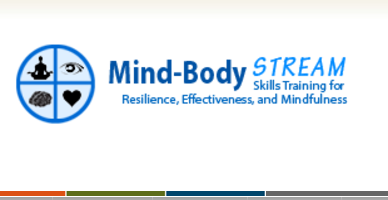Mind-Body Skills Training for Resilience, Effectiveness, and Mindfulness (STREAM) Program is an online education program to help providers increase resiliency in the face of stress and prevent burnout
“Healing Tools” summaries are a collection of evidence-based resources to help providers and patients use integrative health approaches to improve health and well-being.
This tool is for:
- Providers: CME or AMA PRA available
This tool was created by:
- The Ohio State University College of Medicine
SUMMARY
What is this tool for?
Burnout among providers is common, increasing the risk for poor health and poor patient care. Mindfulness-based stress reduction is a popular way to address this.
Mind-Body Skills Training for Resilience, Effectiveness, and Mindfulness (STREAM) is an online education program to help providers learn and practice skills to increase resiliency in the face of stress and prevent burnout.
Program Format and Content
The STREAM program has 12 modules of 1-hour each, in 4 areas:
- Relaxation response:
- Stabilizing attention while decreasing stress
- Mindfulness:
- Cultivating non-judgmental, curious attention
- Heart-centered practices:
- Cultivating positive cognitive-emotional states
- Guided imagery and hypnosis:
- Using focused attention and imagination to achieve goals
Each module includes:
- A case
- Opportunities for self-reflection
- Evidence supporting the skill
- Links to original articles and resources
- Links to MP3 recordings on the skill and other resources
Most modules take about an hour to complete.
The peer review committee at the Center for Integrative Health and Wellness, composed of diverse health professionals and trainees at The Ohio State University, reviewed the STREAM program.
How does this contribute to an integrative approach?
Combining conventional medicine, self-care, and complementary and alternative medicine can help people achieve optimal health and well-being. The STREAM program uses mind-body practices to help providers optimize their health and prevent burnout, enhancing their capacity to provide high-quality integrative care to their patients. Providers can also directly teach many of these skills to patients during a practice visit.
What does the evidence say about this tool?
Evidence about mindfulness:
- Mindfulness increased resilience, self-compassion, and confidence in providing calm, compassionate care and decreased stress in 12 medical trainees.[1]
- Mindfulness training increased resilience in 40 providers (20 midwives and 20 nurses).[2]
Evidence about the STREAM program:
- Trainees who completed mind-body skills training (STREAM) had significantly greater improvements in stress, mindfulness, and confidence in providing calm, compassionate care than those who did not.[3]
- Study details:
- 103 trainees entering: medical school; graduate schools of nursing, social work, and dieticians; and residencies in family medicine and pediatrics.
- 60 participants completed mind-body skills training and 43 either had no training or took the Herbs and Dietary Supplements Across the Lifespan program, also developed by Dr. Kemper.
- Health professionals who completed mind-body skills training (1-3 modules in STREAM) had immediate improvements in mindfulness.[4]
- Study details:
- 229 participants, of whom 178 completed pre/post measures. Participants were nurses, physicians, social workers and psychologists, dietitians, and other health professionals and trainees.
- Modules:
- Introduction to Mindfulness
- Mindfulness in Daily Life
- Mindful Walking and Breathing
- 68% of participants completed all 3 modules
- 70%-78% of participants completed individual modules
- Study details:
- Study details:
Who created this tool?
Kathi Kemper, MD, MPH, developed the STREAM program. Dr. Kemper is a professor of pediatrics, nursing, and dietetics at The Ohio State University College of Medicine and editor-in-chief of Complementary Therapies in Medicine. An authority on integrative and holistic health for children, Dr. Kemper has written more than 150 peer-reviewed publications, dozens of book chapters, reviews, and editorials; and three books: The Holistic Pediatrician; Mental Health Naturally; and Authentic Healing.
ABOUT THESE INTEGRATIVE HEALTH TOOLS
At Healing Works Foundation, we believe that achieving optimal health and wellbeing requires an integrative health approach—one that combines and coordinates conventional medicine, self-care, and complementary and alternative medicine.
Translating Evidence into Action
The goal of these summaries is to help providers and patients learn about and access evidence-based integrative health tools.
Disclosures:
Healing Works Foundation is a nonprofit organization and does not profit from any of the tools featured in these summaries.
Patients: Contact your provider before starting any new health program. Show him/her these resources.
[1] Olson K, Kemper KJ. “Factors Associated with Well-being and Confidence in Providing Compassionate Care.” J Evid Based Complementary Altern Med. 2014:19-292-296.
[2] Foureur M, Besley K, Burton G, Yu , Crips J. “Enhancing the resilience of nurses and midwives: pilot of a mindfulness-based program for increased health, sense of coherence and decreased depression, anxiety and stress.” Contemp Nurse. 2013 Aug;45(1):114-25. doi: 10.5172/conu.2013.45.1.114.
[3] Kemper, K., Lynn, J., & Mahan, J. (2015) “What Is the Impact of Online Training in Mind–Body Skills?” J Evid Based Complementary Altern Med.
https://mind-bodyhealth.osu.edu
[4] Kemper, K. (2016). “Brief Online Mindfulness Training: Immediate Impact.” J Evid Based Complementary Altern Med.

